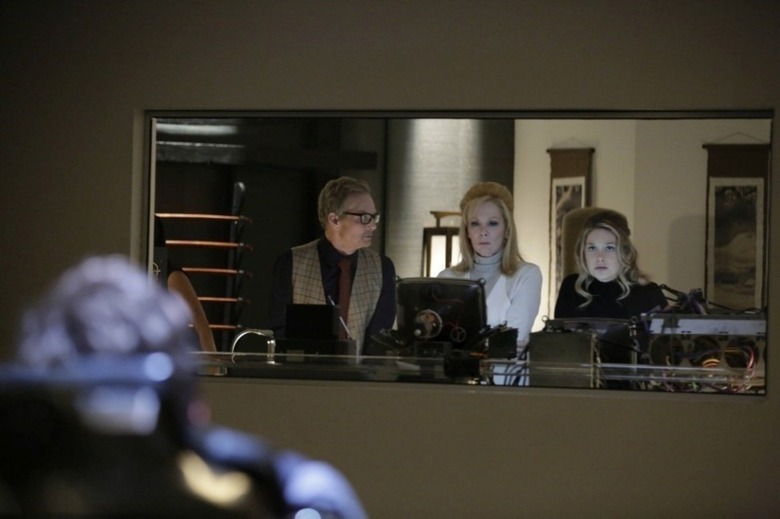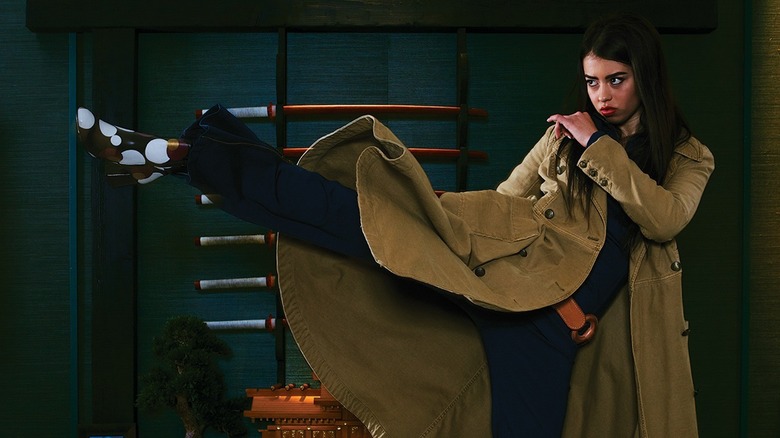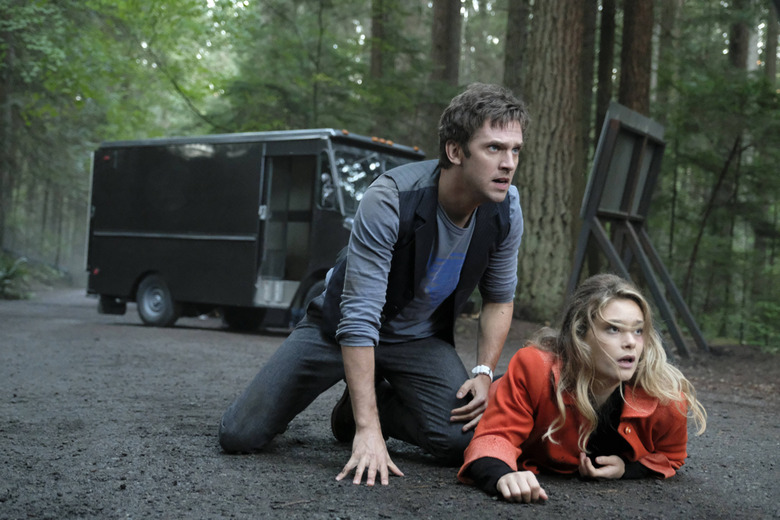'Legion' Spoiler Review: Thoughts On ''Chapter 4''
With "Chapter 4," Legion has reached the halfway point of its first season and delivered its best episode since the pilot. After two episodes of intentional slow burn and uneasy horrors, FX's offbeat X-Men series has reached full nightmarish boil. Let's talk about it.
Legion Has Trained Us to Watch It
Every week, Legion has to find new ways to present concepts that are outrageous and unreal. And every week, the series has utilized stylistic touches both extreme and subtle to sell ideas that should be hard to swallow. The exposition-laden second and third episodes of the first season pay off in "Chapter 4," where the series stops jogging and begins to sprint. By this point, the series trusts, we know how to watch Legion. We know how to read the screen and understand exactly what we're seeing because the show has given us a crash course in how to watch it.
It helps that Legion grounds its surreal, comic book touches in the very language of cinema. Rules are bent and broken, concepts familiar to anyone who has consumed media in some capacity become stand-ins for stranger ideas. Take the opening scene of "Chapter 4," where the sort-of-still-alive Summerland founder Oliver Bird introduces the episode from his icy home on the astral plane, setting the stage for the events of the episode by looking straight into the camera, shattering the fourth wall, and informing us of what we're about the see. It's something we've seen before, a basic Brechtian touch, but in the world of Legion, Oliver's communication with us is less about acknowledging the facade of storytelling and more about telling us what he can literally do. He's a passive observer stranded in a non-physical space – all he can do is watch and comment and wait.
Everything we've seen in the past three hours comes into play here, but the show no longer needs to pause to explain what we're watching. Aspect ratios quietly shift to suggest flashbacks or new changes in perspective. Characters manipulate memories as if they were searching through hours of documentary footage to find that one perfect shot. Legion is many things (a wild mystery, an off-kilter superhero show), but it continues to be a truly pleasurable visual experience that hijacks our typical perceptions and steers us down a strange, new path.
Oliver Bird and the Astral Plane
If the recorded voice of Summerland's absent founder sounded familiar last week, that's because it was the voice of the great Jemaine Clement. And I was wrong last week. Oliver isn't dead – he's simply on a little trip to the astral plane. Well, he's actually stranded, his physical form trapped in a diving suit back on earth while his spirit form lives in a psychedelic ice cube in the sky. If this was a Marvel comic book, the camera could pan left and we'd see Doctor Strange and no one would bat an eye.
Oliver is a welcome addition to Legion's line-up of oddballs and weirdos. In his imaginary kingdom, it's still the past and his unfortunate design choices reflect as much. And in David Haller (Dan Stevens), who was thrust into the astral plane by last week's traumatic psychic voyage, he sees someone he can finally share his music with. Someone with whom he can discuss beat poetry. Is free love still a thing back in the real world, man?
It's not clear what role Oliver will play in the series and like everyone else at Summerland, he doesn't seem like someone we should immediately trust. The fact that he can look into the camera and talk to us certainly suggests that he's an individual with a great deal of power – only those with special abilities can manipulate cinematic language on Legion. But even if he was just a detour, a guest star who pops up to explain the existence of a weird space between dream and reality, he's one one hell of a detour.
A New Figment
How many monsters live inside David's head? We first met the devil with the yellow eyes, but others arrived quickly. Lenny (Aubrey Plaza) continues to haunt and taunt him. The World's Angriest Boy in the World continues to appear suddenly and unexpectedly. His mysterious astronomer father introduced him to the stars and the stars talked back and that's all we know. And then there are the anonymous voices, those that crowd around him and point and jeer. The same voices that, strangely enough, didn't want him to commit suicide.
And in "Chapter 4," we may have just met another one. It turns out that the dog, the adorable Beagle, that we've been seeing in flashbacks for the past few episodes, never existed. He was a figment of David's seemingly ill imagination, another way his "schizophrenia" manifested. However, there's one thing we've learned about these "figments" in four episodes of Legion: they're not not real. Within David's psychic interior, they have agency and they can do harm and they will fight to protect...whatever it is they're protecting. Whatever this dog turns out to be, it's safe to say that it's not just a made-up memory. There are no imaginary friends for David Haller, just passengers he doesn't yet understand.
Cary, Kerry and the Sibling Connection
As is typical with Legion's "show first, explain an episode or two later" philosophy, it took until the halfway point of the first season to learn exactly what's up with Cary (Bill Irwin) and Kerry Loudermilk (Amber Midthunder), Summerland's resident scientist and muscle, respectively. They're siblings, albeit unlike any siblings we've seen before. Born at the same time to the same mother, the two of them "share" the same body, with Kerry living inside of Cary until she's needed. And since Kerry doesn't age while she's inside Cary, the two Loudermilks are vastly different ages. She only comes out to fight, to engage in the exciting stuff. Since that's her entire life, it's no wonder that she seems restless and uneasy in every scene – if she's not immediately useful, why is she wasting her time? Cary, on the other hand, gets to experience the day-to-day tedium of actually living a life.
In keeping with Legion's way of taking more abstract ideas and allowing them to exist literally, these siblings, these twins, actually have the mental connection that so many real-world brothers and sisters talk about. As Kerry battles soldiers from Division 3, doing what she does and loves best, Cary feels her joy and can't help but break into dance while sweeping the floor of his workspace. When she is beaten down, he feels her pain and despair. When she is shot, he feels the wound, too. It's beautiful and it's weird and it simply takes us back to the question Cary himself ponders in the episode: what happens if one of them dies? After all, one conjoined twin cannot survive if the other passes away and while their connections may be a step beyond reality, they are attached in fundamental ways.
Lenny, Benny, and the Not-Quite-Truth
Anyone who thought it was peculiar that David's best friend at Clockworks was also his junkie friend in the time before his hospitalization was on the right track. Reeling from their experiences inside David's mind last week, Syd, Kerry, and Ptonomy put foot to pavement and set out to do some real detective work in "Chapter 4" and learned that David's unreliable mind was hiding even more than they expected. He was hiding the truth about the night where he broke into his doctor's office: he was looking to destroy something, not to steal (not to mention the fact that he also committed assault in the process). And in an even more unsettling twist, they learned that David used to hang out with a middle-aged male junkie named Benny before his time in Clockworks. The memories with Lenny were false.
So...who the hell is Lenny? It can't be a coincidence that her name rhymes with the actual guy David knew before Clockworks. Other characters interacted with her back in "Chapter 1," so we know that she's real in some basic sense. Beyond that, her presence in David's head, her infiltration of his memories, and her "tough love" approach to counseling him on his given situation all remain big ol' mysteries. We don't know what she wants or whether we can actually trust her, whether she's the only one telling him the truth or a devil whispering in his ear. She's crude and lewd, but does that make her any less fishy than Melanie Bird and her cult-like compound and possible ulterior motives? Should David trust the voices in his head or reject them outright?
One thing seems certain, though. David was only able to escape the astral plane after being taunted by Lenny, teleporting his mind and body to the exact place he needed to be. Once again, David's powers are not triggered by choice, but by interaction with the figments living inside his brain.
Not Quite a Superhero
Despite the X-Men connections, Legion has avoided being a typical comic book adventure since its opening moments and "Chapter 4" finds the show once again side-stepping convention. In this case, the episode's grand finale drops David into a heroic situation, only for him to botch the whole thing because he has limited information and because his fellow mutants have confusing powers. It's an absurd clusterfuck – how was the unpredictable psychic time bomb supposed to know that his body-swapping girlfriend was inhabiting the form of his arch-enemy when he arrived to save the day? It's an amusing and frustrating-by-design finale, but it drives home a larger truth inside of a typical comic book observation. You don't become a superhero overnight and simply assessing your personal issues does not give you power over them. Both require work.
So let's await next week with a question: when Lenny presented the dire situation to David, when she gave him the motivation to find his powers and escape the astral plane, how much did she actually know? And what does her smile, seen in the final moments of the episode, actually mean? We're at the halfway point of season one and this feels like the most important query going forward: should David literally trust himself?




